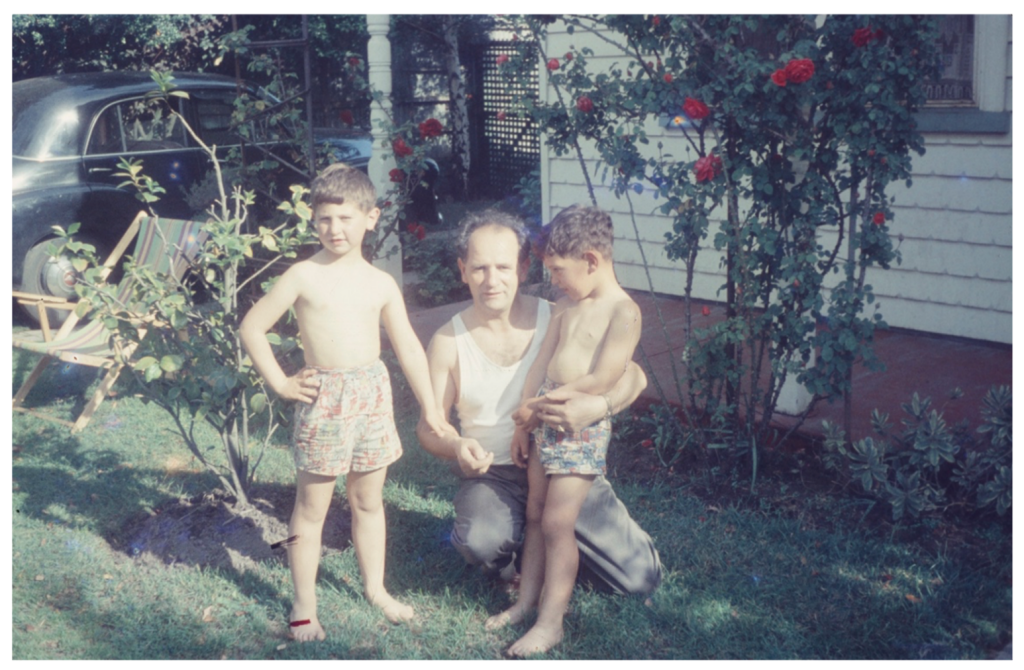
‘Revenge: Our Dad the Nazi Killer’ // Bonsai Films
‘Revenge: Our Dad the Nazi Killer’ was reflective.
In the years following the Second World War, Australia had the second highest percentage of Holocaust survivors per capita in the world. Many Jewish people immigrated to the country in search of a better life. But the same boats that brought Holocaust survivors over also brought across several hundred Nazis and Nazi collaborators, war criminals that were being granted safe passage despite their history. When faced with a government that had quietly decided not to pursue further justice against these Nazis, former members of a WWII Jewish resistance movement called the “Partisans” opted to take matters into their own hands. ‘Revenge: Our Dad the Nazi Killer’ is the story of one of those Partisans and his sons unearthing a well-kept secret decades later.
‘Revenge’ follows the three sons of Boris Green; Jack, Jon and Sam, as they sift through their family history and public records, interview various parties, and enlist the help of retired detective John Garvey to attempt to make sense of their late father’s life. The documentary weaves a narrative of confusion and focuses on the men’s personal grapples with the notion that they did not fully know their father.
Director Danny Ben-Moshe utilises a combination of archive footage as well as new interviews and documentary footage to tell the story. Editor Hugh Williams effectively blends the two together to tell the unfurling narrative of both the past and present. Archive footage of Boris and his brother Fima reveals more about their prevailing hatred for the Nazi party, and present-day investigations show how they may or may not have acted on this.
Throughout the documentary, there is never a sense of complete certainty surrounding what Boris did. Focus instead is placed on the question of whether or not he was right to do it. While Ben-Moshe and the Green brothers attempt to leave it open-ended, the answer seems to be a resounding yes. Every conversation the brothers and Garvey have with other Holocaust survivors and their relatives reveals little, if any, adversity to the idea that taking vengeance on surviving Nazis was a moral act.
“My father’s family was wiped out and my immediate reaction is… who am I to judge?” – Jon Green (Yehiel Grenimann)
One of very few moments where Boris’s acts are called into question is a point where Jon, his eldest son who is now a Rabbi, sits in a car with Garvey and discusses whether or not what Boris did was right. The two also discuss with another Rabbi, John Levi, whether it can be considered a revenge killing or an “extra-judicial” killing, to which the answer they receive is “I would describe it as justice.”
Indeed, the imagery used by Ben-Moshe to highlight what Boris and other Holocaust survivors went through leaves little room for interpretation. The mystery in part becomes “Why were these war criminals being allowed to live in Australia?” And the answer is a combination of laziness on the part of the Australian, British and United States governments, and a desire to keep some of them around for intel about fighting the soviets. When contrasted so viscerally with imagery of concentration camps, stories of the violence, rape, torture and mass murder of the Jewish people, and Jon and Jack’s visits to the ghetto in Lithuania that once housed their father, it is easy to see why this justification did not placate Boris and his fellow Partisans.
‘Revenge: Our Dad the Nazi Killer’ is a story about a man’s attempts to make sense of the world through revenge, and the subsequent story of his son’s attempts to make sense of him. It is a deeply personal story that doesn’t shy away from its subject matter, and nor should it. Putting everything into perspective only raises more questions and no one is ever fully satisfied, but the final note we leave on is a positive one. ‘Revenge’ is a fascinating story to see unfold and I can only recommend it.
‘Revenge: Our Dad the Nazi Killer’ opens in cinemas on Thursday, 7 December 2023.






